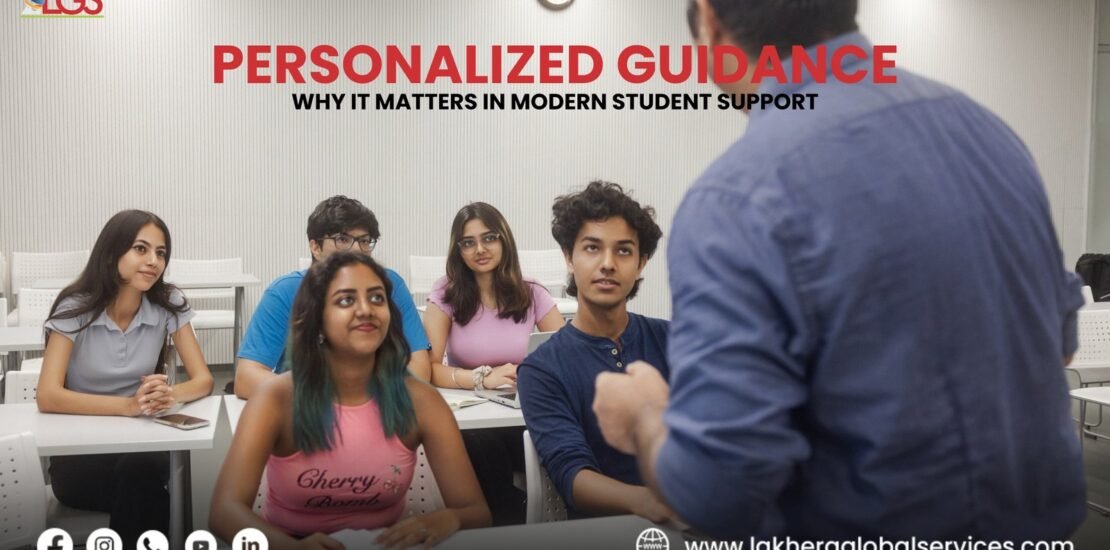Personalized Guidance: Why It Matters in Modern Student Support
- April 25, 2025
- Posted by: admin amdin
- Category: Education Marketing

In today’s evolving educational landscape, where students have countless career paths and academic resources at their fingertips, one aspect remains crucial—Personalized Guidance. As institutions across Mohali, Chandigarh, and the broader Tricity area adopt digital transformation, the role of tailored student support has become more significant than ever.
Personalized guidance isn’t just about helping students pick a subject or fill out a form. It’s a holistic approach that considers the individual learning style, interests, goals, and challenges of each student. Whether through one-on-one counseling, AI-powered tools, or mentor-driven models, institutions that invest in personalized support are witnessing improved academic performance, retention rates, and student satisfaction.
Why Personalized Guidance Is the Backbone of Modern Education
1. Empowers Students to Make Informed Decisions
With a variety of courses, certifications, and career paths available, students often feel overwhelmed. Personalized guidance helps them assess their interests, strengths, and long-term goals, ensuring they choose the right path from the start.
2. Improves Academic Performance
Tailored learning strategies and academic coaching based on individual pace and style lead to better engagement and outcomes. Students with consistent support are more likely to succeed in assessments and maintain a strong academic record.
3. Enhances Emotional and Mental Well-being
Modern student support includes mental health and stress management. Personalized mentoring allows for early identification of stress, anxiety, or burnout, and directs students toward necessary resources.
4. Boosts Retention and Reduces Dropout Rates
When students feel seen and heard, they are more likely to stay committed. Institutions with personalized support systems have significantly lower dropout rates.
5. Builds Stronger Relationships Between Students and Institutions
A personalized touch creates trust and fosters a sense of belonging—critical for student loyalty and positive word-of-mouth.
Key Components of an Effective Personalized Guidance Program
-
One-on-One Mentorship
Mentors—whether faculty members or trained counselors—play a pivotal role in offering tailored advice and emotional support, bridging the gap between institution and student.
-
Data-Driven Student Insights
Using digital tools and analytics, institutions can monitor student behavior, engagement, and performance to deliver relevant interventions.
Example: Learning Management Systems (LMS) can track student activity and highlight those who may need extra help.
-
Career Mapping Tools
Digital career assessment platforms help students identify their ideal career paths based on interests, skills, and academic performance.
-
Personalized Learning Paths
AI-driven platforms like Coursera and Khan Academy offer adaptive content based on student performance, reinforcing the importance of tailored education.
-
Academic Coaching and Skill Development
Programs tailored to each student’s needs—be it soft skills, time management, or technical knowledge—can greatly enhance overall performance and confidence.
The Role of Technology in Delivering Personalized Guidance
Technology is not just a support system in modern education—it’s a driving force behind how institutions deliver personalized experiences to students. With the increasing complexity of educational choices, diverse learning needs, and heightened expectations, technology empowers educators and administrators to offer timely, relevant, and data-backed guidance that was previously difficult to scale.
Here’s how various technologies are making personalized student support more impactful and accessible:
1. AI-Powered Virtual Counselors and Chatbots
Artificial Intelligence (AI) is revolutionizing student interaction. Virtual counselors and smart chatbots can offer 24/7 support for common queries—like course selection, deadlines, and career advice—tailored to each student’s academic journey.
- Example: A student struggling with math might receive automatic suggestions for extra tutorials, peer study groups, or remedial classes.
- Benefit: Frees up human counselors for complex cases while ensuring that no student query goes unanswered.
2. Learning Management Systems (LMS)
LMS platforms such as Moodle, Canvas, or Google Classroom are not just content delivery tools—they serve as central hubs of personalized learning.
- Capabilities:
- Track individual student progress and engagement
- Recommend content based on performance
- Highlight students at risk of falling behind
These systems allow teachers to design adaptive learning paths based on how a student is performing, helping them catch up or move ahead as needed.
3. CRM Tools for Education
Customer Relationship Management (CRM) tools like Salesforce Education Cloud or HubSpot for Education help institutions manage and nurture student relationships across their lifecycle.
- How it helps:
- Personalized communication campaigns
- Academic reminders and motivational nudges
- Tracking academic advising interactions
- Behavioral insights to tailor student outreach
This ensures every student receives guidance at the right time, enhancing both academic and emotional support.
4. Analytics and Dashboards for Informed Decision-Making
Data analytics tools process large amounts of student data—grades, attendance, login frequency, assessment scores—and transform them into actionable insights.
- For institutions: Helps counselors identify at-risk students
- For students: Provides visual progress reports and alerts
- For parents: Offers transparency into their child’s development
This data-driven personalization ensures support is targeted and evidence-based.
5. Career Assessment and Exploration Platforms
Platforms like Career Explorer, Mindler, or Mettl assess students’ aptitudes, personality types, and career interests using psychometric analysis and behavioral algorithms.
- Outcome: Students receive personalized career pathways that align with both their passions and job market trends.
- Bonus: Institutes can better align curriculum offerings with student interests and future opportunities.
6. Virtual Reality (VR) and Augmented Reality (AR)
While still emerging, VR/AR technologies are becoming part of the personalized education ecosystem.
- Use case: Career simulations, virtual college tours, or immersive learning experiences tailored to the student’s interests.
- Impact: Helps students visualize their future career or course outcomes in a more engaging and realistic way.
7. Mobile Apps for Guidance and Tracking
Personalized learning apps enable students to get tips, resources, assignments, and reminders directly on their phones.
- Examples: Remind, myON, Duolingo
- Features: Goal setting, progress tracking, push notifications
These tools bring real-time, contextual guidance to the student’s fingertips, fostering a more independent and informed learning journey.
8. Cloud-Based Portals and ERP Integration
Educational ERP systems combine admissions, academics, counseling, and placement into a unified dashboard. When connected to cloud portals, this allows seamless data flow and real-time access to guidance tools.
- Example: A student portal that shows academic progress, upcoming events, personalized counseling session schedules, and placement opportunities—all tailored to individual needs.
| Tech Tool | Function |
| AI Chatbots | Instant academic and emotional support |
| LMS Analytics | Monitor performance and engagement |
| ERP Systems | Centralize student data and behavior |
| Virtual Reality | Simulate career paths or learning environments |
Use Cases: How Institutions Are Embracing Personalized Guidance
Case Study: Mohali-Based College Increases Retention by 20%
A mid-tier college in Mohali implemented a tech-enabled mentorship program that paired students with advisors. Using ERP and LMS data, mentors provided weekly updates and interventions. Within two semesters, dropout rates fell by 20%, and satisfaction surveys improved by 40%.
Case Study: Chandigarh Institute Uses AI for Career Counseling
A Chandigarh-based institute adopted an AI-driven tool to recommend career paths based on student preferences and academic history. As a result, placement success rates increased by 15% in just one year.
How Lakhera Global Services Pvt Ltd Can Help
At Lakhera Global Services, we believe that personalized support isn’t just a trend—it’s the future of education. Our digital marketing and tech-driven solutions help institutions create robust student support systems. From implementing CRM tools to creating AI-powered learning journeys, we help you deliver experiences that your students will remember—and recommend.
Before You Go: Challenges and Considerations
While personalized guidance is incredibly effective, institutions must also be aware of:
- Scalability: Can your current model support growing student populations?
- Data Privacy: Are student data and interactions secure?
- Training: Are faculty and staff prepared to offer customized support?
By addressing these issues early on, institutions can deliver sustainable and ethical personalized guidance programs.
Conclusion: Personalization Isn’t a Luxury—It’s a Necessity
As we look ahead, education must evolve to meet the needs of the individual learner. Personalized guidance is no longer optional; it’s a core requirement of modern student support. It drives better outcomes, fosters meaningful relationships, and sets the stage for lifelong success.
If you’re an educational institution in Mohali or anywhere in the Tricity region looking to implement smart, student-first systems—Lakhera Global Services Pvt Ltd is here to help. Let’s create a future where every student has the support they need to thrive.
Call us today or Email us to explore our tailored solutions.
Visit: www.lakheraglobalservices.com
FAQs: Personalized Guidance in Education
1. What is personalized guidance in education?
It refers to customized academic, career, and emotional support tailored to each student’s unique needs and goals.
2. Why is personalized guidance important for student success?
It improves decision-making, academic performance, emotional health, and overall student satisfaction.
3. How can colleges implement personalized guidance?
Through mentorship programs, AI tools, LMS platforms, and data-driven analytics.
4. Can small institutions in Tricity afford personalized systems?
Yes! Scalable tech solutions like LMS and CRM make it affordable and effective.
5. How can Lakhera Global Services help with this?
We provide digital tools and strategies tailored for institutions looking to enhance student support through personalization.





